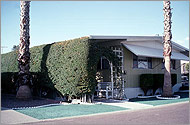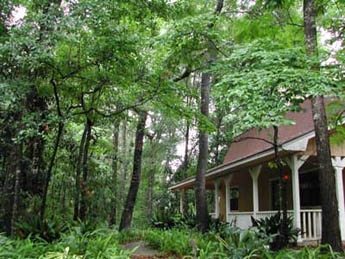
A trellis with a climbing vine can shade a home and allow air circulation.
Photo credit: John Krigger, Saturn Resource.
Solar Heat and Evapotranspiration
Solar heat absorbed through windows and roofs can increase your air conditioner use. Incorporating shading concepts into your landscape design can help reduce this solar heat gain, reducing your cooling costs.
Shading and evapotranspiration (the process by which a plant actively moves and releases water vapor) from trees can reduce surrounding air temperatures as much as 9 F (5C). Because cool air settles near the ground, air temperatures directly under trees can be as much as 25F (14C) cooler than air temperatures above nearby blacktop.
Using shade effectively requires you to know the size, shape, and location of the moving shadow that your shading device casts. Also, homes in cool regions may never overheat and may not require shading. Therefore, you need to know what landscape shading strategies will work best in your regional climate and your micro climate
Selecting the right trees
Trees can be selected with appropriate sizes, densities, and shapes for almost any shading application. To block solar heat in the summer but let much of it in during the winter, use deciduous trees. To provide continuous shade or to block heavy winds, use dense evergreen trees or shrubs.

Deciduous trees with high, spreading crowns (i.e., leaves and branches) can be planted to the south of your home to provide maximum summertime roof shading. Trees with crowns lower to the ground are more appropriate to the west, where shade is needed from lower afternoon sun angles. Trees should not be planted on the southern sides of solar-heated homes in cold climates because the branches of these deciduous trees will block some winter sun.
Although a slow-growing tree may require many years of growth before it shades your roof, it will generally live longer than a fast-growing tree. Also, because slow-growing trees often have deeper roots and stronger branches, they are less prone to breakage by windstorms or heavy snow loads. Slow-growing trees can also be more drought resistant than fast-growing trees.
A 6-foot to 8-foot (1.8-meter to 2.4-meter) deciduous tree planted near your home will begin shading windows the first year. Depending on the species and the home, the tree will shade the roof in 510 years. If you have an air conditioner, shading the unit can increase its efficiency by as much as 10%.
Shading the ground and pavement
Trees, shrubs, and ground cover plants can also shade the ground and pavement around the home. This reduces heat radiation and cools the air before it reaches your home's walls and windows. Use a large bush or row of shrubs to shade a patio or driveway. Plant a hedge to shade a sidewalk. Build a trellis for climbing vines to shade a patio area.
Vines can also shade walls during their first growing season. A lattice or trellis with climbing vines, or a planter box with trailing vines, shades the home's perimeter while admitting cooling breezes to the shaded area.
Shrubs planted close to the house will fill in rapidly and begin shading walls and windows within a few years. However, avoid allowing dense foliage to grow immediately next to a home where wetness or continual humidity are problems. Well-landscaped homes in wet areas allow winds to flow around the home, keeping the home and its surrounding soil reasonably dry.
 Print
Print Email
Email







